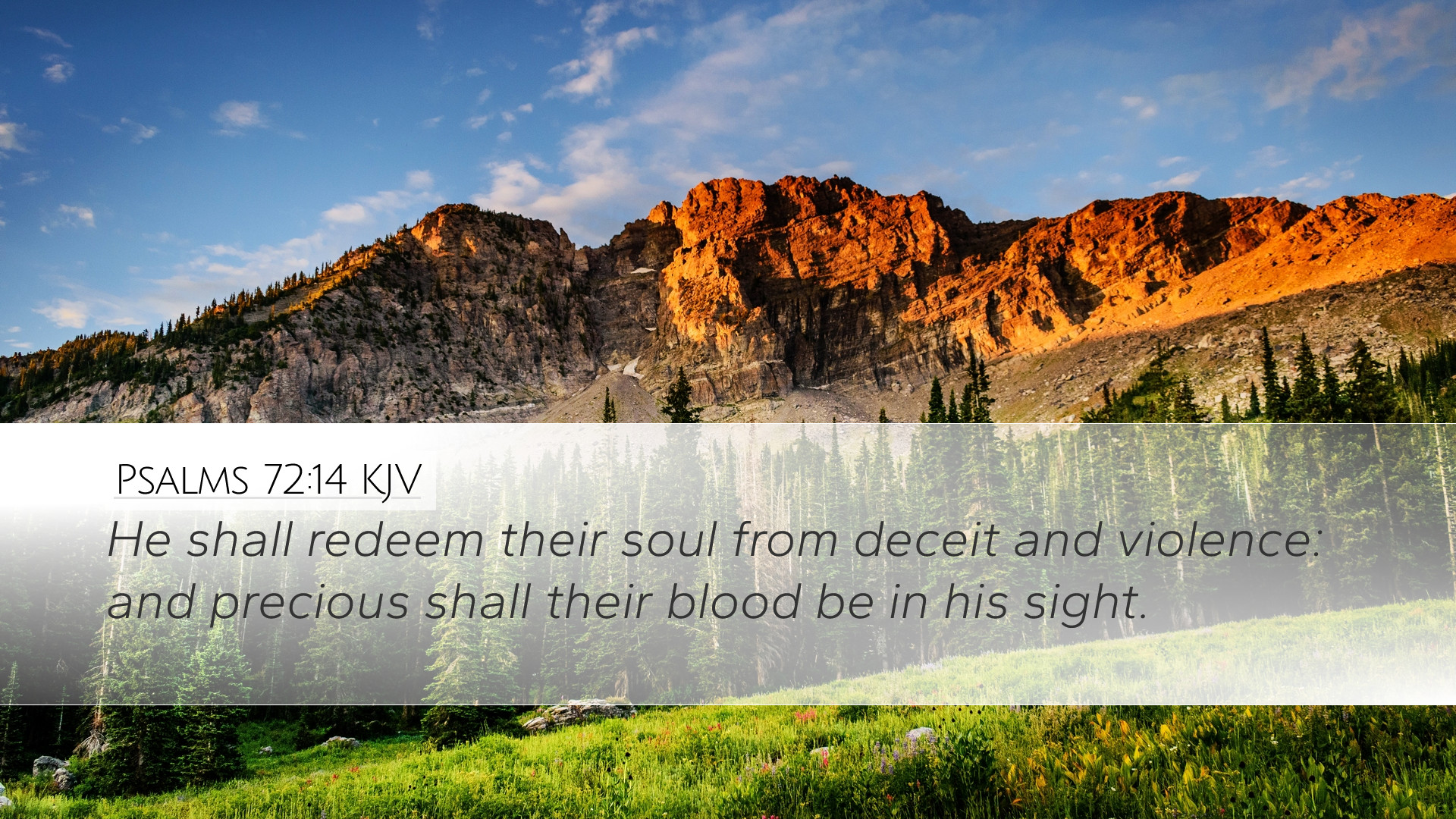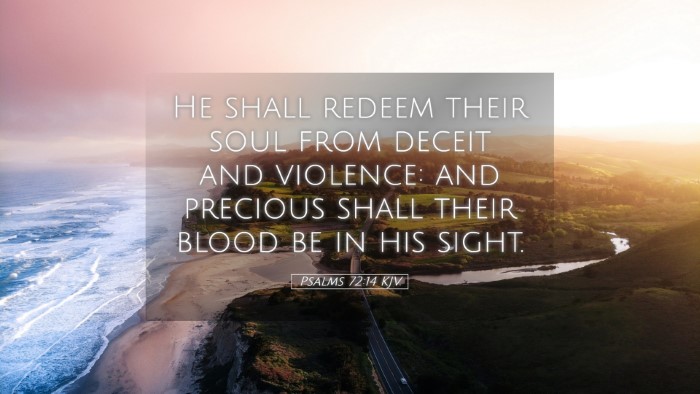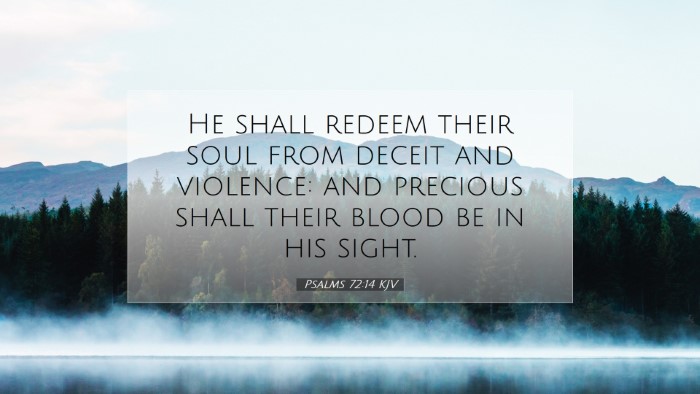Psalms 72:14 Commentary
Psalms 72:14 reads: "He shall redeem their soul from deceit and violence: and precious shall their blood be in his sight." This verse speaks to the heart of God's justice and mercy, emphasizing His role as a protector and redeemer of His people. Below, we explore various insights from prominent public domain commentaries.
Context and Overview
The Psalm is a royal psalm attributed to Solomon, requesting God's blessing upon the king and the kingdom. In this context, Psalms 72 emphasizes the responsibilities of leadership, particularly the necessity of justice, righteousness, and compassion. The verse highlights God’s commitment to redeeming the soul of the oppressed, illuminating the divine concern for those harmed by deceit and violence.
Insights from Matthew Henry
Matthew Henry compressively discusses Psalms 72, noting that it details the ideal king who governs with righteousness. In reference to verse 14, he highlights the following:
- Redemption of Souls: Henry underlines the significance of God as a redeemer, illustrating that this redemption involves rescuing the oppressed from peril and injustice. The "soul" signifies the entire being, indicating a holistic salvation.
- Valuing Life: The phrase "precious shall their blood be in his sight" conveys the high value God places on life. Henry asserts that human life, particularly that of the oppressed, is considered sacred, warranting divine attention and care.
- Divine Justice: He stresses the importance of God’s justice in redeeming the victims of deceit and violence, illuminating the divine attributes of compassion and righteousness.
Insights from Albert Barnes
Albert Barnes provides a detailed exegetical approach and emphasizes the practical implications of the verse:
- Protection Against Injustice: Barnes points out that the Psalm is a plea for divine protection against forces that would harm the innocent, establishing that God actively works to redeem those suffering from injustice.
- Concept of "Blood": He interprets "blood" as a representation of life, and its "preciousness" suggests that God views the lives of His people as invaluable, affirming their worth in the face of oppression.
- Endurance of the Righteous: Moreover, Barnes highlights the promise that, despite violence and deceit, believers can find solace in God’s love and justice, which will ultimately lead to their deliverance and vindication.
Insights from Adam Clarke
Adam Clarke's commentary provides a practical application and further theological depth:
- The Nature of Deceit and Violence: Clarke notes that deceit and violence are common themes within human society, and God's redemptive work is crucial in overcoming such adversities. He emphasizes that God's salvation is not just from external enemies but also from internal sins and struggles.
- Affirmation of Worth: Clarke reaffirms the idea that God values the blood of the innocent, suggesting that every act of violence against an individual affects God deeply. This highlights the relational aspect between God and humanity—a God who feels the pains and injustices faced by His people.
- The Assurance of Redemption: In reflecting on redemption, Clarke encourages the faithful to trust in God’s promises, knowing that He sees their suffering and will act on their behalf. This verse instills hope that God is aware of every injustice and is prepared to redeem.
Theological Implications
The theological implications of Psalms 72:14 are profound. This verse serves as a reminder that:
- God as Redeemer: The aspect of God as a redeemer is central in biblical theology. This verse affirms that God does not turn a blind eye to suffering, but actively seeks to redeem those who are vulnerable.
- Ethics of Advocacy: Believers are called to emulate God's justice by advocating for those who are oppressed, thereby reflecting God’s character in their actions.
- Value of Human Life: The emphasis on the "preciousness" of blood establishes a theological foundation for discussing human dignity and the sanctity of life, which can inform societal attitudes toward justice and care.
Pastoral Reflections
For pastors and church leaders, this psalm presents critical avenues for preaching and application:
- Comfort to the Afflicted: Use this passage to provide comfort and hope to those suffering injustices, reminding them of God’s redemptive work.
- Teach about Justice: Encourage a series of teachings on the importance of justice in the ministry, emphasizing how God’s character should shape the church’s response to societal issues.
- Call to Action: Mobilize congregations to engage in community service and advocacy for justice, demonstrating the church's commitment to reflect God’s values.
Conclusion
Psalms 72:14 serves as a powerful assertion of God’s redeeming love and justice. Through insights from traditional commentaries, we see the depth of meaning encapsulated in this verse, which extends beyond mere historical context to inform present-day faith and practice. Whether approached from a scholarly perspective or a pastoral context, this verse invites believers to trust in God's active role as defender and redeemer.


